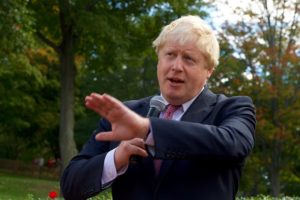
British Foreign Secretary Boris Johnson, addresses students from the Fletcher School of Law and Diplomacy and Tisch College on September 24, 2016, at Gifford House on the campus of Tufts University in Medford, Mass., before a meeting of the so-called Quintet in the Secretary’s home-state of Massachusetts. [State Department photo/ Public Domain]
Boris Johnson, the former foreign secretary and mayor of London who has pledged to take Britain out of the European Union on Oct. 31, is set to become British prime minister on Wednesday after winning the leadership of the ruling Conservative Party.
His tenure will almost certainly be defined by Brexit, one of the greatest political challenges faced by any British prime minister since World War II and one that ended the careers of his two immediate predecessors.
“I know that there will be people around the place who will question the wisdom of your decision,” said Mr. Johnson to a packed auditorium. “We are going to energize the country, we are going to get Brexit done on Oct. 31 and we’re going to take advantage of all the opportunities it will bring in a new spirit of can-do.”
His anointment will herald a period of intense political and economic uncertainty for the U.K., with the prospect of a sudden break from the EU and questions about how long his minority government will last.
Mr. Johnson, whose decision to campaign for Brexit during the 2016 referendum was regarded as decisive, beat Foreign Secretary Jeremy Hunt in a vote on Tuesday for the nomination as Conservative Party leader. He won by 92,153 votes to 46,656.
President Trump applauded Mr. Johnson’s victory. “Congratulations to Boris Johnson on becoming the new prime minister of the United Kingdom. He will be great!” he said on Twitter.
Read more here.





